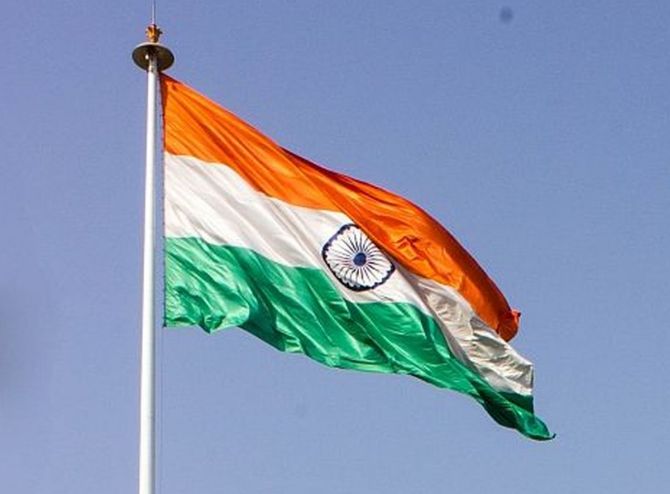Cutting a huge cake depicting the National Flag and eating it could not be construed as an offence punishable under the relevant Act, the Madras high Court ruled on Monday.

Justice N Anand Venkatesh gave the ruling, while allowing a criminal original petition from a policeman in Coimbatore and held that such an act could not be construed as an offence under Section 2 of the Prevention of Insults to National Honour Act, 1971.
At a public function organised to celebrate Christmas on December 25, 2013, in Coimbatore, a cake measuring 6-ft in length and 5-ft in breadth, the icing on which carried a tri-colour with Indian map outline and Ashoka Chakra in the centre, was allegedly cut.
It was distributed and consumed by the special guests and about 2,500 participants including 1,000 children.
Then Coimbatore district Collector and a deputy commissioner of police also took part in the celebration.
Contending that this amounted to disrespecting the National Flag, D Senthilkumar of Hindu Public Party, lodged a police complaint.
As there was no action, he moved the local Magistrate court, which on February 17, 2017 directed registering of a first information report against the persons concerned for the offence under Section 2 of the Act and file a final report.
Aggrieved, the local inspector moved the high court with the present petition.
Allowing it, the judge observed that patriotism is not determined by a gross physical act.
The intention behind the act will be the true test and it is possible that sometimes the very act itself manifests the intention behind it.
In the present case, even if the entire set of facts stated in the complaint are taken as it is, it must be seen as to what would have been the actual feeling with which the participants would have dispersed after the function was over.
Will they be feeling great pride in belonging to this great nation, or would the pride of India have come down on the mere cutting of a cake during the celebration.
Without any hesitation, this court can hold that the participants would have felt only the former and not the latter, the judge said.
For proper understanding, the judge cited a hypothetical case of wide participation in an Independence Day or Republic Day celebration.
During such celebrations, the participants are provided with a national flag to be worn by them. In reality, after the participants leave the venue, they do not continue to possess the flag forever and it becomes part of any other waste paper.
Will this mean that each of the participants has insulted the national Flag and should be proceeded against under Section 2 of the Act? The obvious answer is in the negative, the court observed.
If persons are allowed to give such broad meaning to the word 'insult', many will become very uncomfortable and hesitant to handle the national Flag.
The National Flag is given during the function as a symbol of national pride. Once such a feeling is created in the minds of the participants, the purpose for which the national Flag was given or used will be achieved, the judge noted.
The Flag Code does provide a mechanism to destroy flags in private, in a manner consistent with the dignity of the flag and as a responsible citizen, it should be followed in letter and spirit.
Not all will be aware of this procedure and therefore, that by itself will not make them susceptible to committing an offence under Section 2 of the Act, the judge said.
"This Court ventured to give such an extreme illustration only to drive home the point that a wayfarer, for the mere sake of publicity, should not be allowed to expose people to criminal prosecution for some innocuous acts which by themselves cannot be construed to be an insult to make it an offence under Section 2 of the Act," the judge said.
He held that the complaint does not make out an offence and quashed the Magistrate's order.











 © 2025
© 2025